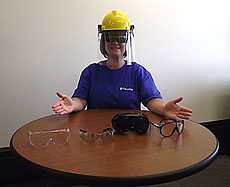See into the future with eye protection
 |
| ESH&Q's Kathy Zappia displays some of the different types of protective eyewear that can be purchased at the Fermilab Stockroom. Photo courtesy of Kathy Zappia |
You may have heard the phrase "keep your eyes on the job." It means more than just paying attention to what you are doing; it means properly wearing the correct eye protection for the job you are doing. The form of eye protection you choose will depend upon the activity and degree of the hazard involved.
Basic types of eye protection:
Safety glasses. Safety glasses have impact-resistant glass, plastic or polycarbonate lenses and safety frames designed to prevent the lenses from being pushed into your eyes upon impact. Standard safety glasses offer basic protection from jobs where a hazard may strike you from in front. When equipped with side shields or cups, additional protection is given where a hazard may come from the front, side, above or below. Tinted lenses provide protection from radiation hazards.
Safety goggles. Safety goggles are also impact-resistant and available with tinted lenses. They provide a secure shield around the entire eye area and give protection against hazards coming from many directions. They are used in sawing, soldering and when using chemicals. Goggles with indirect ventilation may be required if you are exposed to splash hazards.
Shields and helmets. Face shields and helmets alone are not protective eyewear. They are frequently used in conjunction with safety glasses or goggles for chemicals, heat or radiation hazards. Helmets are most commonly used when welding or working with molten materials.
Your eyewear should fit well, be comfortable to wear and should not cause headaches, slip off easily or fog up.
Nonprescription safety eyewear is available from the Fermilab Stockroom in clear, amber or dark (optical density 3).
Prescription safety eyewear is available from a vendor that is on site from 9 a.m. to noon Wednesdays in Wilson Hall in the ground-floor ESH&Q Training Room.
Keep your eyes on the job:
- Encourage control of workplace eye hazards.
- Use dust extractors, exhaust systems and screens to reduce airborne particles.
- Prevent splashes of harmful liquids by using screens, splash guards and splash trays.
- Clean your protective eyewear regularly.
- Keep protective eyewear in good condition and replace damaged lenses and loose frames immediately.
- Know where eyewash stations are and how to use them in an emergency.
- Have your vision tested regularly.
- Remove contact lenses when performing tasks that may cause irritation under the lens, such as handling solvents.
As you can see, there's more to keeping your eyes on the job than keeping them open. Keep them protected!
—J.B. Dawson
|